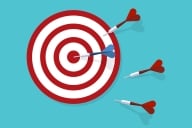You have /5 articles left.
Sign up for a free account or log in.
Before you read this review of The Invisible Gorilla: And Other Ways Our Intuitions Deceive Us by Christopher F. Chabris and Daniel Simons - watch this video:
You probably noticed the gorilla - but if we had not been looking for it at least half of us would have failed to notice its appearance.
This is the famous invisible gorilla experiment, familiar to anyone who has been reading the growing body of cognitive psychology and behavioral economics books about the (predictable) limits of our brains.
The sad fact is that none of us are as smart, rationale, analytical, or emotionally balanced as we perceive ourselves to be (unless we are clinically depressed, the only people who can accurately judge their own looks, performance, or status). We better face up to the fact that we miss more than we ever recognize (the gorilla experiment), and we forget more than we remember (and when we remember we tend to re-write those memories to make us the stars of the action).
We over-value what we have (loss aversion), and are slow to give up existing beliefs (even in the face of overwhelming evidence). We fail to listen to arguments that don't conform to what we already believe (confirmation bias), and give too much weight to arguments that match our existing beliefs. We confuse confidence with knowledge, good looks with expertise, and wrongly assume that skills in one domain (say athletics) transfer to other settings.
We over-think when we should listen to our guts, and listen to our guts when we should take some time and think things through. We see causality when only correlation exists. We see narrative when the only explanation is random chance. We give ourselves too much credit for success, and too much blame for failure. We assume we are exceptional, when in reality almost all of us are merely average.
Does know this change our behavior? If us academic types recognize just how likely we are to get it wrong, to miss the gorilla, will it change how we approach our jobs? Will we be better teachers, administrators, librarians, and technologists knowing how clueless we really are?
I have a growing library of books to teach me all the things that I'm not very good at. I like this library - these books sort of take the pressure off. If you liked the following books I'm sure you will greatly enjoy The Invisible Gorilla (which, by the way, is well above average in the quality of its writing).
Here is my "why we are so dumb" list of books - can you suggest any additions?:
- Predictably Irrational, by Dan Ariely
- The Upside of Irrationality: The Unexpected Benefits of Defying Logic at Work and at Home, by Dan Ariely
- Being Wrong: Adventures in the Margin of Error, by Kathryn Schulz
- Welcome to Your Brain: Why You Lose Your Car Keys but Never Forget How to Drive and Other Puzzles of Everyday Life, by Sandra Aamodt and Sam Wang
- Brain Rules, by John Medina
- Why We Make Mistakes, by Joseph T. Hallinan
- How We Decide, by Jonah Lehrer
- Blink: The Power of Thinking Without Thinking, by Malcolm Gladwell
- The Black Swan: The Impact of the Highly Improbable, by Nassim Nicholas Taleb
- Gut Feelings: The Intelligence of the Unconscious, by Gerd Gigerenzer
- Sway: The Irresistible Pull of Irrational Behavior, by Ori Brafman and Rom Brafman
- Nudge: Improving Decisions About Health, Wealth, and Happiness, by Richard H. Thaler and Cass R. Sunstein
- The Drunkard's Walk: How Randomness Rules Our Lives, by Leonard Mlodinow
- Kluge: The Haphazard Construction of the Human Mind, by Gary Marcus
- Stumbling on Happiness, by Daniel Gilbert
- The Ape in the Corner Office, by Richard Conniff
What are you reading?








